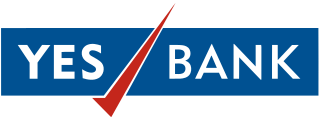Subscription refers to the process of investors signing up and committing to invest in a financial instrument, before the actual closing of the purchase. The term comes from the Latin word subscribere.

The Securities and Exchange Board of India (SEBI) is the regulatory body for securities and commodity market in India under the administrative domain of Ministry of Finance within the Government of India. It was established on 12 April 1988 as an executive body and was given statutory powers on 30 January 1992 through the SEBI Act, 1992.
Cheque clearing or bank clearance is the process of moving cash from the bank on which a cheque is drawn to the bank in which it was deposited, usually accompanied by the movement of the cheque to the paying bank, either in the traditional physical paper form or digitally under a cheque truncation system. This process is called the clearing cycle and normally results in a credit to the account at the bank of deposit, and an equivalent debit to the account at the bank on which it was drawn, with a corresponding adjustment of accounts of the banks themselves. If there are not enough funds in the account when the cheque arrived at the issuing bank, the cheque would be returned as a dishonoured cheque marked as non-sufficient funds.

A giro transfer, often shortened to giro, is a payment transfer from one current bank account to another bank account and initiated by the payer, not the payee. The debit card has a similar model. Giros are primarily used in Europe; although electronic payment systems exist in the United States, it is not possible to perform third-party transfers with them. In the European Union, the Single Euro Payments Area (SEPA) allows electronic giro or debit card payments in euros to be executed to any euro bank account in the area.

A traveller's cheque is a medium of exchange that can be used in place of hard currency. They can be denominated in one of a number of major world currencies and are preprinted, fixed-amount cheques designed to allow the person signing it to make an unconditional payment to someone else as a result of having paid the issuer for that privilege.

A cheque is a document that orders a bank, building society to pay a specific amount of money from a person's account to the person in whose name the cheque has been issued. The person writing the cheque, known as the drawer, has a transaction banking account where the money is held. The drawer writes various details including the monetary amount, date, and a payee on the cheque, and signs it, ordering their bank, known as the drawee, to pay the amount of money stated to the payee.

A permanent account number (PAN) is a ten-character alphanumeric identifier Foundational ID, issued in the form of a laminated "PAN card", by the Indian Income Tax Department, to any person who applies for it or to whom the department allots the number without an application. It can also be obtained in the form of a PDF file known as e-PAN from the website of the Indian Income Tax Department.
A direct debit or direct withdrawal is a financial transaction in which one organisation withdraws funds from a payer's bank account. Formally, the organisation that calls for the funds instructs their bank to collect an amount directly from another's bank account designated by the payer and pay those funds into a bank account designated by the payee. Before the payer's banker will allow the transaction to take place, the payer must have advised the bank that they have authorized the payee to directly draw the funds. It is also called pre-authorized debit (PAD) or pre-authorized payment (PAP). After the authorities are set up, the direct debit transactions are usually processed electronically.

An overdraft occurs when something is withdrawn in excess of what is in a current account. For financial systems, this can be funds in a bank account. In these situations the account is said to be "overdrawn". In the economic system, if there is a prior agreement with the account provider for an overdraft, and the amount overdrawn is within the authorized overdraft limit, then interest is normally charged at the agreed rate. If the negative balance exceeds the agreed terms, then additional fees may be charged and higher interest rates may apply.

Payment cards are part of a payment system issued by financial institutions, such as a bank, to a customer that enables its owner to access the funds in the customer's designated bank accounts, or through a credit account and make payments by electronic transfer with a payment terminal and access automated teller machines (ATMs). Such cards are known by a variety of names, including bank cards, ATM cards, client cards, key cards or cash cards.
Book building is a systematic process of generating, capturing, and recording investor demand for shares. Usually, the issuer appoints a major investment bank to act as a major securities underwriter or bookrunner.
Qualified institutional placement (QIP) is a capital-raising tool, primarily used in India and other parts of southern Asia, whereby a listed company can issue equity shares, fully and partly convertible debentures, or any securities other than warrants which are convertible to equity shares to a qualified institutional buyer (QIB).
PayMate is a business-to-business (B2B) digital and financial services company headquartered in Mumbai.
Tamilnad Mercantile Bank Limited (TMB) is an Indian bank headquartered at Thoothukudi, Tamil Nadu. TMB was founded in 1921 as the Nadar Bank, but changed its name to Tamilnad Mercantile Bank in November 1962 to widen its appeal beyond the Nadar community. The bank currently has 509 full branches throughout India, 12 regional offices and two link offices, two central processing centres, one service branch, four currency chests, 48 eLobby centres, 262 cash recycler machines and 1151 automated teller machines (ATM).
Indian Depository Receipt (IDR) is a financial instrument denominated in Indian Rupees in the form of a depository receipt. The IDR is a specific Indian version of the similar global depository receipts.

Yes Bank is an Indian private sector bank, headquartered in Mumbai, catering to retail customers, MSMEs, and corporate clients. The bank was founded by Ashok Kapur. Its network is spread across 300 districts in India and comprises 1,198 branches, 193 BCBOs and 1,287+ ATMs.

Central Depository Services (India) Ltd. (CDSL) is an Indian central securities depository, founded in 1999.
The Sahara -SEBI case is the case of the issuance of Optionally Fully Convertible Debentures issued by the two companies of Sahara India Pariwar to which Securities and Exchange Board of India had claimed its jurisdiction and objected on why Sahara has not taken permission from it.

Computer Age Management Services Limited (CAMS) is a mutual fund transfer agency serving Indian asset management companies. The company was incorporated in 1988 and is headquartered in Chennai. It became publicly listed in October 2020, subsequent to an initial public offering (IPO) through an offer by its existing shareholders.
Paytm Payments Bank (PPBL) is an Indian payments bank, founded in 2017 and headquartered in Noida. In the same year, it received the license to run a payments bank from the Reserve Bank of India and was launched in November 2017. In 2021, the bank received a scheduled bank status from the RBI.








